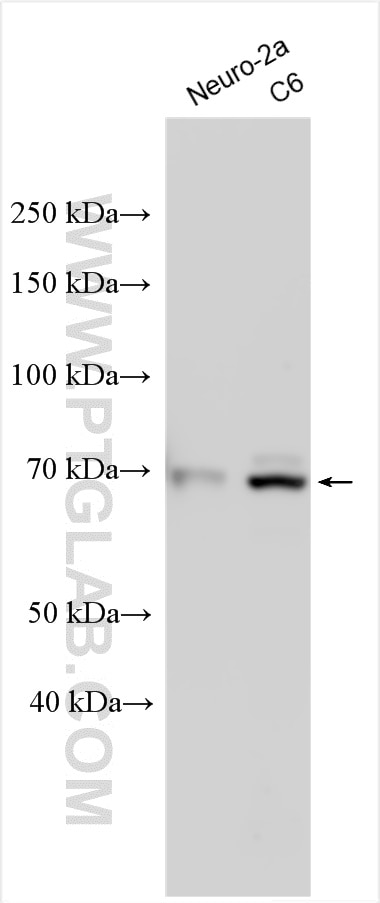CHRNA4 Polyclonal antibody
CHRNA4 Polyclonal Antibody for WB, ELISA
Host / Isotype
Rabbit / IgG
Reactivity
human, Mouse
Applications
WB, ELISA
Conjugate
Unconjugated
Cat no : 21939-1-AP
Synonyms
Validation Data Gallery
Tested Applications
| Positive WB detected in | Neuro-2a cells, C6 cells |
Recommended dilution
| Application | Dilution |
|---|---|
| Western Blot (WB) | WB : 1:1000-1:4000 |
| It is recommended that this reagent should be titrated in each testing system to obtain optimal results. | |
| Sample-dependent, Check data in validation data gallery. | |
Product Information
21939-1-AP targets CHRNA4 in WB, ELISA applications and shows reactivity with human, Mouse samples.
| Tested Reactivity | human, Mouse |
| Host / Isotype | Rabbit / IgG |
| Class | Polyclonal |
| Type | Antibody |
| Immunogen | CHRNA4 fusion protein Ag16584 |
| Full Name | cholinergic receptor, nicotinic, alpha 4 |
| Calculated Molecular Weight | 627 aa, 70 kDa |
| Observed Molecular Weight | 69 kDa |
| GenBank Accession Number | BC096290 |
| Gene Symbol | CHRNA4 |
| Gene ID (NCBI) | 1137 |
| Conjugate | Unconjugated |
| Form | Liquid |
| Purification Method | Antigen affinity purification |
| Storage Buffer | PBS with 0.02% sodium azide and 50% glycerol pH 7.3. |
| Storage Conditions | Store at -20°C. Stable for one year after shipment. Aliquoting is unnecessary for -20oC storage. 20ul sizes contain 0.1% BSA. |
Background Information
This gene encodes a nicotinic acetylcholine receptor, which belongs to a superfamily of ligand-gated ion channels that play a role in fast signal transmission at synapses. These pentameric receptors can bind acetylcholine, which causes an extensive change in conformation that leads to the opening of an ion-conducting channel across the plasma membrane. This protein is an integral membrane receptor subunit that can interact with either nAChR beta-2 or nAChR beta-4 to form a functional receptor. Mutations in this gene cause nocturnal frontal lobe epilepsy type 1.
Protocols
| Product Specific Protocols | |
|---|---|
| WB protocol for CHRNA4 antibody 21939-1-AP | Download protocol |
| Standard Protocols | |
|---|---|
| Click here to view our Standard Protocols |


